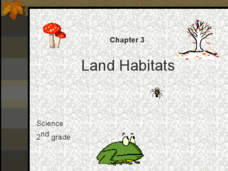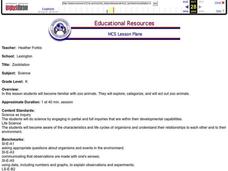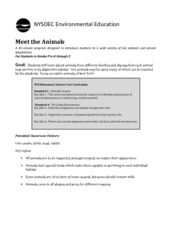Curated OER
Animals Galore
A well-designed lesson which covers the characteristics of the animals found in the six animal groups is here for your young biologists. In it, learners divide up into six groups; the amphibians, reptiles, mammals, birds, fish, and...
Curated OER
Animals and Plants of BC's Rocky Shore
Students fill out a fact sheet and look at diagrams of BC's shore and the animals that live there. In this habitat lesson plan, students discuss the plants and animals and the different zones they live in.
Education Outside
Animal Homes in the Garden
First graders journey to the school garden to examine the habitats of garden animals. Using the provided graphic organizer, kids locate and sketch a critter and its habitat before returning it to its home.
Curated OER
Land Habitats: Grade 3 Science
Build your students scientific vocabulary with this slide show on land habitats. Each slide provides a vocabulary word, image, and definition of a term common to habitats and the environment. Great for science class or as comprehensible...
Curated OER
Habitats
Students identify butterfly habitats. In this butterfly habitats lesson, students read and discuss Where Butterflies Grow. Students study pictures and guess which are butterfly habitats. Students list the life needs of butterflies and...
Curated OER
Habitats: Cactus Hotel
A reading of Brenda Z. Guiberson’s, Cactus Hotel, launches a study of animal habitats. Working with parent volunteers or teacher aides, groups travel outside the classroom to select a habitat, take digital pictures, and incorporate the...
Curated OER
Animal and Plant Habitats
Second graders write and illustrate a story. In this habitats lesson, 2nd graders learn about different types of plant and animal habitats. Students view video segments about habitats, answer comprehension questions, complete a crossword...
Curated OER
Plants and Animals of Great Bay Animals and Plants of the Estuary
Students participate in a webquest about the plants and animals that inhabit an estuary. They role play as environmentalists researching this habitat and present the results of their research in a creative way.
Curated OER
Flutterings and Flowers
Fourth graders investigate the significance of natural resources and the habitats of butterflies. They create a list of their own favorite foods, then watch a video about habitats. Students identify things in the video that animals and...
Channel Islands Film
Natural Resources, and Human Uses of Plants and Animals
As part of their study of the restoration projects on Santa Cruz Island, class members demonstrate their understanding of the connections among plant life, animals, and the actions of humans by crafting a model that reveals these...
Curated OER
Carrying Capacity
Young biologists identify how plants and animals are affected by changes in their ecosystem and environment. The concepts of succession, maintenance of habitats, interrelationships, and adaptation are all discussed. This...
Curated OER
Plants and Animals
Students find common needs between plants and animals. In this plants and animals lesson students compare that both plants and animals need food and water. They also find the differences between plant and animal needs.
Curated OER
Introducing Habitats and Biodiversity
Students identify habitats in Arizona. Theys define and illustrate a food web, and explain the importance fo biodiversity.
Curated OER
Animals and Engineering
Students study animal classification and their interactions. In this animals and engineering lesson students study animal communities and how engineers use this knowledge to create new technologies.
Curated OER
Friends on the Farm
Young farmers explore the world of farm animals. They are introduced to a variety of animals, what their role is, how many legs they have, and what sounds they make. Worksheets and websites embedded in the plan are used to carry it out....
Curated OER
Zoobilation
Youngsters become familiar with zoo animals. They sort them into categories, and choose an animal to act out. Two zoo centers are created in the classroom that have examples of the animals for the pupils to play with. Then, they choose...
Curated OER
Plant Power
Here is an opportunity for your first graders to take a close look at plants: what they need to survive, how they grow, and the names of each plant part. The book, Corduroy's Garden is used to open the activity. Then, youngsters utilize...
Curated OER
Force of Habitat
Plants and animals of the desert are the subject of this lesson. While the activities involve an exploration involving Nevada, this resource could be altered for use with any area. This detailed lesson includes a list of books that could...
Curated OER
Meet the Animals
The class will examine a series of live or stuffed animals in order to learn how different animals survive in distinctive habitats. As they examine each animal, they will be asked a series of critical thinking questions geared at getting...
Curated OER
The Chesapeake Bay in Captain John Smith's Time
When Captain John Smith visited the Chesapeake Bay in the summer of 1608, what types of animals and habitats did he encounter? Your young historians will analyze primary source documents to answer this question, as well as compare...
Curated OER
Habitats of the World
Learners discover that the Earth supports many different animal habitats. In this habitat lesson students research different habitats of the world. Learners show how the animals in their habitat are adapted.
ARKive
Adaptations to Arid Habitats
How do plants and animals survive in habitats with very little water? Explore arid ecosystems and the way their inhabitants have adapted with a activity and science experiment. After kids listen to a presentation about adaptation, they...
Curated OER
Plankton in the Air
Here is a lab activity adequate for use with any full lesson plan on environmental factors that shape animal adaptations or marine animal characteristics. Pupils will discuss the role plankton plays in the environment and filter-feeding...
Curated OER
Go To Sleep, Gecko!
Second graders examine the interdependence of organisms using the book "Go To Sleep, Gecko!" They examine a variety of food chains, listen to the book, and answer story comprehension questions. Students then conduct research on food...























